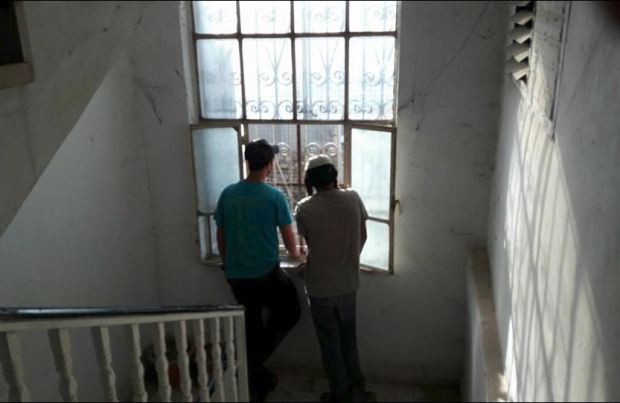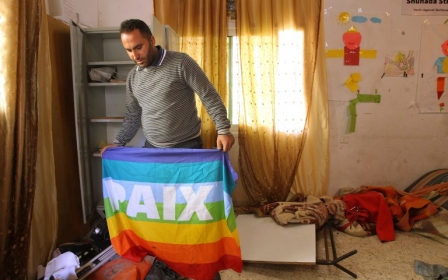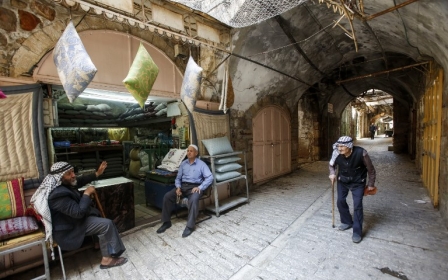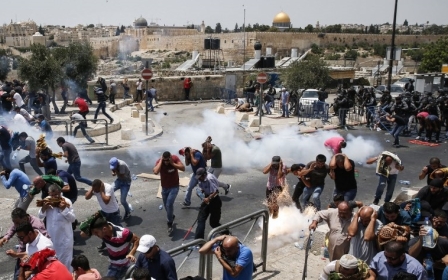Israeli settlers illegally occupy Palestinian home in Hebron

JERUSALEM - More than 100 Israeli settlers are occupying a Palestinian home in the flashpoint city of Hebron in the occupied West Bank, in what they said was a response to the ongoing situation in Jerusalem.
The settlers have barricaded themselves in, according to witnesses, and are flying Israeli flags on the roof of the building.
The house – owned by the al-Rajab family, but known to Israelis as Beit HaMechpela – lies close to the Ibrahimi Mosque, site of the 1994 massacre by an extremist Israeli-American which killed 29 Palestinians.
Hazim Abu Rajab al-Tamimi, the son of the owner, said that the army had declared the area a closed military zone, and 200 settlers were surrounding the building.
"We have asked the local courts to evict them, as this is illegal," he said. "We are awaiting a response."
Imad Hamdan, manager of the rebuilding committee of Hebron, said that the authorities could easily have prevented the settlers from entering the property, and could force them to evacuate now.
"The Israeli army and police could stop the settlers from occupying the house," he told MEE.
"Occupiers are supposed to provide protection for those they occupy, according to the Geneva Convention," he said, referring to the Israeli occupation of the West Bank.
Despite the ongoing legal proceedings, the settlers had been given the green light to occupy the house at a political level, Hamdan added, citing reports in the Israeli media that Prime Minister Benjamin Netanyahu asked his defence minister to order authorities not to intervene to evict the settlers.
Hamdan also said the settlers’ move was likely made possible by the ongoing situation in Jerusalem, where tension is simmering over security measures around the Al-Aqsa Mosque, after the shooting dead of two Israeli security guards there.
What is happening in Jerusalem has an impact in Hebron and we feel that
- Imad Hamdan, manager of the rebuilding committee of Hebron
"These violations by the Israeli government come at the same time as the attacks in Jerusalem," Hamdan said.
"What is happening in Jerusalem has an impact in Hebron and we feel that. Al-Aqsa is a twin to the Ibrahimi Mosque, Hebron is a twin to Jerusalem."
Speaking from inside the house, the settlers’ spokesperson Shlomo Levinger said that the occupation of the building was our "real response to those who murder us and kill us," referring to the Israeli authorities backtracking on installing metal detectors around the Al-Aqsa Mosque.
Path of Jewish settlement
"This is a symbol of the path of Jewish settlement in Hebron. This is the city of the fathers and by the help of God we will hold it, and we will spread, and we will live here," he said in a video statement.
Anti-settlement Israeli NGO Peace Now has urged the authorities to evict the settlers, and said some 15 families have occupied the house.
"We demand that the government orders the immediate evacuation of the settlers who invaded Beit HaMachpela," it said in a statement.
The house is the subject of an ongoing legal battle, and Israeli settlers were originally evicted from the same building in 2012, after failing to produce the legal documents proving their claims to have bought it.
"After their claims of ownership had been denied, the settlers have decided to take the law into their own hands and establish an illegal settlement that might ignite the region," Peace Now’s statement added.
Mariam Fleischmann, another settler, said that she would recommend the experience to all Hebron mothers and that it was proving an exciting and educational opportunity for her nine children.
"We do not plan to go anywhere. We have a sofa and a fridge and everything we need."
This article is available in French on Middle East Eye French edition.
Middle East Eye propose une couverture et une analyse indépendantes et incomparables du Moyen-Orient, de l’Afrique du Nord et d’autres régions du monde. Pour en savoir plus sur la reprise de ce contenu et les frais qui s’appliquent, veuillez remplir ce formulaire [en anglais]. Pour en savoir plus sur MEE, cliquez ici [en anglais].





